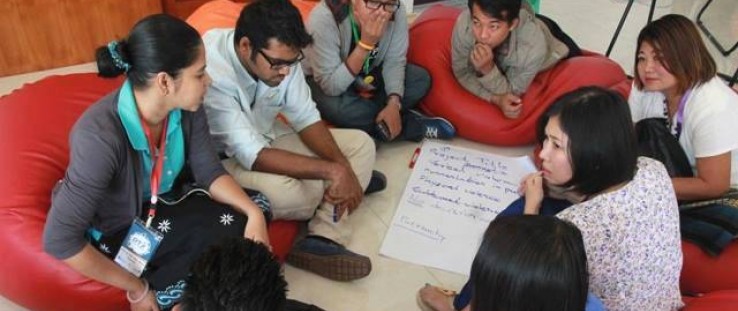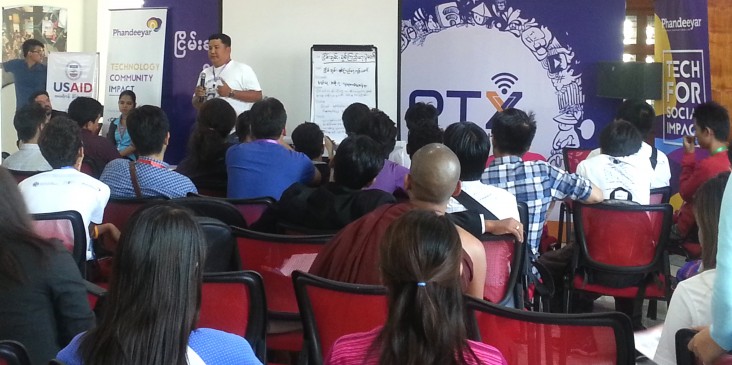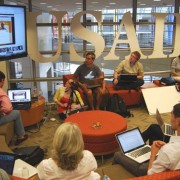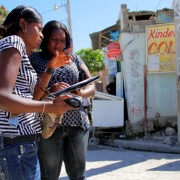 A team discusses how to address dangerous speech during the PeaceTech Exchange in Burma.
MIDO
A team discusses how to address dangerous speech during the PeaceTech Exchange in Burma.
MIDO
 A team discusses how to address dangerous speech during the PeaceTech Exchange in Burma.
MIDO
A team discusses how to address dangerous speech during the PeaceTech Exchange in Burma.
MIDO
RANGOON, Burma—In Burma, rapid growth in online access and rising nationalism has led to an alarming increase in “dangerous speech” and represents a growing concern to the country’s ongoing political transition. Racial slurs, online rumors and doctored imagery have the potential to disrupt or weaken the credibility of the country’s general election scheduled for the fall, and there are fears that it could even trigger isolated or widespread violence.
In response to this concern, USAID is supporting efforts by international and local partners to use new technology to identify and respond to dangerous speech, which can often start as a local dispute that then fuels long-standing social or economic grievances.
“I came back from work by bus one evening,” recalled Pyae Sone Win, a volunteer for Interfaith Youth Coalition in Rangoon. “The Hindu bus driver asked for the price of flowers from a young boy who was selling flowers on the road.” When the bus driver said that he was no longer interested in buying the flowers, the young boy called him a derogatory name and threatened to feed him pork.
In June 2014, violence broke out in Mandalay, Burma’s second largest city, when mobs converged on a teashop owned by a Muslim man accused of raping a Buddhist woman. Two people were killed and five were injured in the resulting violence. All told, more than 500 people have died from sectarian violence in the western state of Rakhine and central Burma in several incidents dating back to 2012.
In January, USAID’s Office of Transition Initiatives supported the United States Institute of Peace, Myanmar ICT for Development Organization (MIDO) and Phandeeyar, a Burmese technology innovation lab, to host the country’s first, three-day PeaceTech Exchange in the country’s commercial capital, Rangoon.
PeaceTech brought together more than 120 civil society leaders from across Burma with 25 local and international technologists with the aim of developing innovative ways to address dangerous speech. Given the nature of dangerous speech in Burma, key religious figures also attended. Seventy percent of participants came from outside Rangoon, including the more remote ethnic areas of Rakhine, Kachin, Shan and Chin states.
“Even if we are not shooting each other with guns, we are shooting each other with words,” Nay Phone Latt, a Burmese blogger, activist and executive director of MIDO, told participants. “We are all here today because we want peace.” Based in Rangoon, MIDO is well-known for its national campaign against dangerous speech, called Panzagar.
The event started with a round of “speed geeking,” where participants interacted with international experts who had used technology to mobilize community response in their home countries. Participants also looked at ways to monitor online dangerous speech, counter dangerous speech in remote areas and spread messages of peace. Teams developed ideas on how to use Facebook groups to connect people working to stop the spread of dangerous speech, SMS platforms to manage rumors, digital storytelling to raise awareness about dangerous speech, and news apps to help people identify dangerous speech.
Virtual chat rooms, Facebook and other technologies are changing the way people communicate—and how dangerous speech spreads. While social media is used by a small percentage of the population in Burma—12 percent of the country has access to mobile service and less than 5 percent has access to the Internet—online posts spread quickly through word of mouth and traditional media.
“Internet users from other places spread information about skirmishes to local ethnic people who then share information back to their respective ethnic armed groups,” said Khun Nga Bad Hto, an information officer for Kayan New Generation Youth in Loikaw, capital of the eastern state of Kayah.
Khu Balu Muu, an organizer for the Meiktila Youth Network based in the central region of Mandalay, came to PeaceTech because he works with youth who belong to different religions and wants to help them understand the risks of dangerous speech. “I learned how to use peace technologies in armed conflict areas and met participants living in different areas,” he said.
Using the connections made at PeaceTech, the Meiktila Youth Network partnered with MIDO to conduct research on drivers of dangerous speech in central Burma and to start a watch group led by local youth. Muu also traveled with a monk he met at PeaceTech from the neighboring region of Magway to co-host an awareness-raising event about the dangers of dangerous speech in the northeastern state of Shan.
Officials believe PeaceTech jump-started an important conversation about how new technology can support citizens to address dangerous speech. “The challenge in Burma is to move from ‘no tech’ to ‘low tech’ approaches to deal with complex social problems that manifest as dangerous speech and intercommunal violence,” said Christopher Wyrod, deputy country representative with USAID’s Office of Transition Initiatives. “PeaceTech Exchange was an important first event that introduced committed young activists to new tools that can help them advance tolerance and peace during this tumultuous transition period.”












Comment
Make a general inquiry or suggest an improvement.